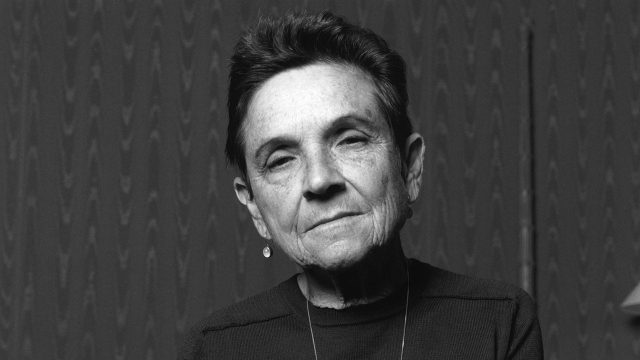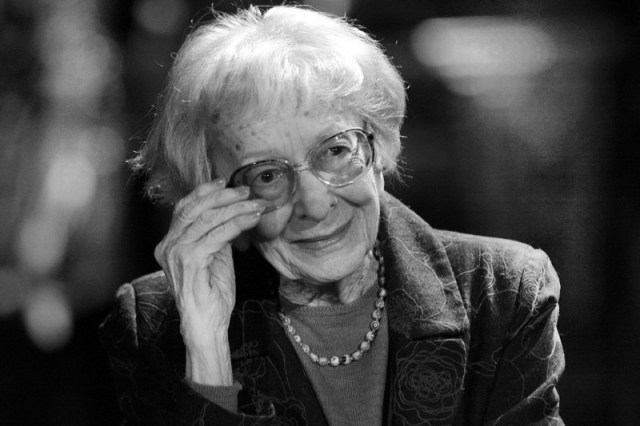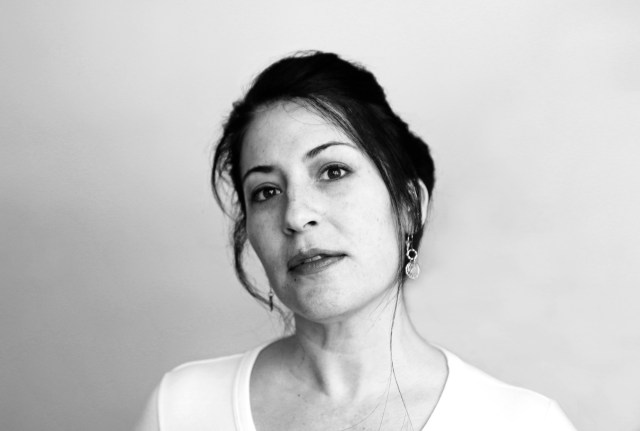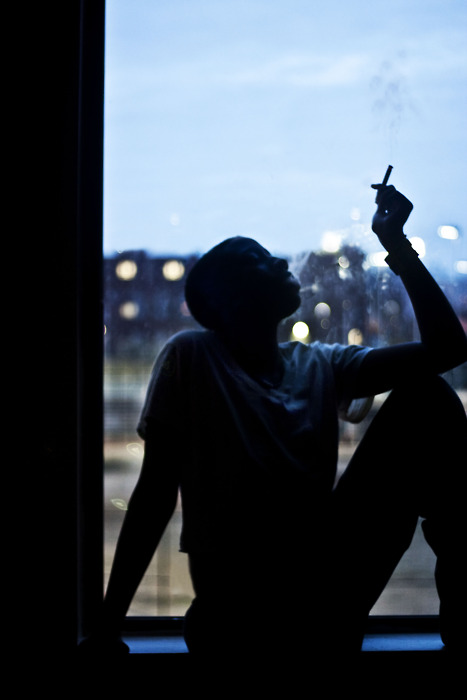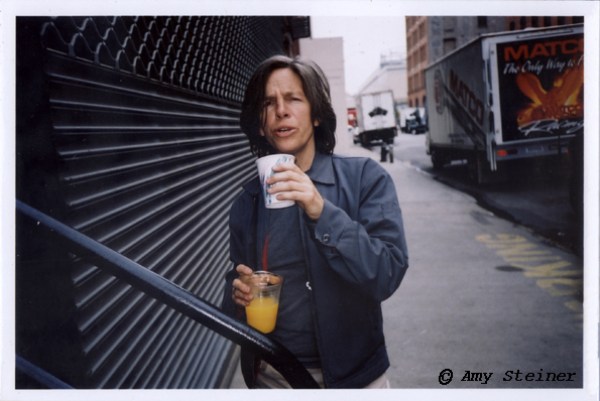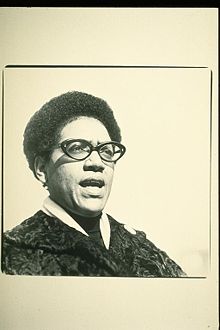9 Poems to Read in These Trying Times
I know right now everything seems to be completely overwhelming, chaotic, lost, and up in the air. You, in turn, are probably feeling helpless and disoriented, not sure what is real or how to react to what you hear every day. The news cycle alternating between doom and gloom.
Since the onset of Coronavirus, I’ve been worried. For myself and for others that don’t have the means to handle a sudden sickness well, and let’s be honest, everyone who is handling it well seems to be massively rich celebrities and billionaires who can afford to get tested at a moment’s notice. It’s hard to conceive of what we can do during these times. Spending time in isolation is lonely, heading out despite the warnings puts others at risk. We feel inclined to spend all day scrolling on our phones, but staying obsessively caught up with what’s going on is unhealthy. The only things that seems to be certain are our fear and the fact that, after this moment, things will be forever changed.
Despite all of this, there are places for solace in such uncertainty. One place that I have found comfort before and continue to find it now is in poetry, the words of others who have experienced and seen unspeakable things and come out on the other side. I read the following poems when things are getting bleak for me; they are either inspiring or just downright beautiful. I hope you can find some comfort in them, too.
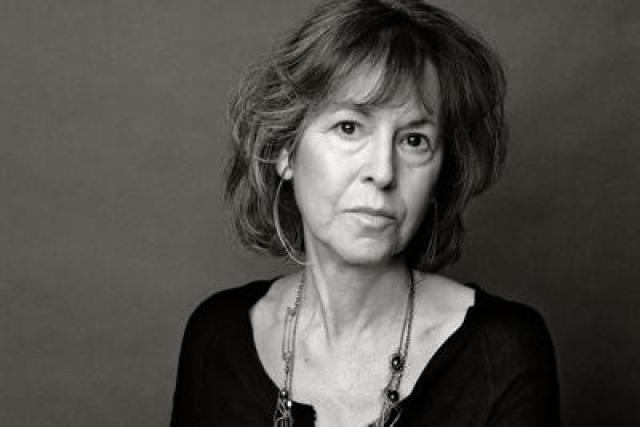
The Wild Iris — Louise Glück
“At the end of my suffering
there was a door.”
begins this powerful and resonate poem. Louise Glück is a poet who’s sharp lines and introspection can teach any novice writer a thing or two about craft. This poem is a persona poem, written from the voice of the named flower, but through excellent metaphor, Glück is able to make its message applicable to any living being. She is one of my favorite poets because she’s able to relay the harshness of reality in such measured and stunning lines, in a language that is both blunt but flowering. The poem goes on to add that:
You who do not remember
passage from the other world
I tell you I could speak again: whatever
returns from oblivion returns
to find a voice:
Things come to an end so new beginnings can arise, our suffering is not fruitless. Not just suffering, but the things that challenge us, whether that be a global pandemic or personal troubles. Glück is one of my favorite poets because of the way she questions or sheds light on some of the more complicated facets of our humanity. The iris’ chief message is that we can come back from being decimated, and will often return to a much brighter future.
Try to Praise the Mutilated World — Adam Zagajewski
I often see this poem floating around Facebook after what some would consider a national tragedy. It is a mainstay because it is so powerful. The premise itself is simple, to praise the mutilated world means to try and find beauty in a time and place where there is loss and grief. To look at the things around you that can still bring joy and a feeling of togetherness when it feels like the world is falling apart. This poem gets chosen a lot because it revels in those small moments of joy, like a concert or tasting strawberries.
You should praise the mutilated world.
Remember the moments when we were together
in a white room and the curtain fluttered.
Return in thought to the concert where music flared.
You gathered acorns in the park in autumn
and leaves eddied over the earth’s scars.
I wouldn’t say that to despair is easy, to go out shopping and panic buy isn’t “easy” — its a natural reaction to an unprecedented situation (at least for Americans). People are scared and rightfully so. What helps, I think, is knowing there is something on the other side of fear. The hard thing is reaching for that other side without knowing exactly what we will pull toward us. Zagajewski comes from a generation of protest poets, poets that saw atrocities and decided they had not only to bear witness, but also act. It’s why people turn to poets like him when we’re shocked and at a loss for words and actions.
Diving Into the Wreck — Adrienne Rich
This may not be the first Rich poem that comes to mind for a topic like this but it’s one of my favorites. She is another poet whose activism is well known along with her creative work. In Sister Outsider, there is a great interview between Rich and Audre Lorde about their relationships to poetry that is worth a read. “Diving into the Wreck” is a poem about exploration and what we can find emerging from destruction.
I came to explore the wreck.
The words are purposes.
The words are maps.
I came to see the damage that was done
and the treasures that prevail.
I stroke the beam of my lamp
slowly along the flank
of something more permanent
than fish or weed
It takes the reader outside of themselves and into the world of the strange, elaborate creatures, mystery, and truth, not a myth. I come to this poem when I am feeling lust for breadth, to be encapsulated by water and sound. It is a long, deep slip into another universe and sometimes we need a little escapism.
Presence — Nikola Madzirov
One of the images from this poem that sticks with me comes in the beginning lines:
Put on the space suit of the night
and slice the apple in two
without damaging the seeds
The image of a deft hand slicing an apple without doing damage to the seeds conjures a kind of artful precision that carries throughout the poem. Madzirov is a Macedonian poet who I got the chance to meet my sophomore year of college and discuss the importance of art in times of trouble. This poem, for me, is a constant refrain and source of inspiration that I pull on when I find myself being pulled into a depression. I have also quoted this poem in a different piece for Autostraddle and it feels ever relevant as I move through my quarantined days. Especially these following lines:
Be a dream, a mezzanine,
sesame seeds at the bottom of the package,
a ‘deer’ sign by the road, an alphabet
known only to two people—
you and the one who doesn’t believe you.
These lines for me call the reader to be of surprise and splendor, no matter the circumstance they are in, whether or not they are believed. It is a poem that is surreal in its magic and reciting it to myself somehow makes me feel more grounded in the physical realm while taking my body into space. To be a dream is to become the life beyond our imagination, to be something incredible and beyond reality; to be a mezzanine is to be a part of where the art is made; to be the sesame seeds is to be that source of splendor, to not be forgotten.
Catalogue of Unabashed Gratitude — Ross Gay
There are so many things that delight me about this poem, that take my breath away, that I couldn’t not put it on this list. It is as it says — a catalog of different gratitudes, some you may find strange and others you may agree with. There is no other way to describe it but as bursting with exuberance. When you read it, you can’t help but smile along with each line as a new joy is unraveled.
I am so grateful,
you could ride your bike there
or roller skate or catch the bus
there is a fence and a gate twisted by hand,
there is a fig tree taller than you in Indiana,
it will make you gasp.
It might make you want to stay alive even, thank you
Who among us wouldn’t be amazed by a fig tree taller than us? The beauty in this gratitude is something that is important to hold on to through times of trouble. Even as I am frustrated by the actions of politicians and corporations, I am in awe of the creativity of my friends and family. I’m grateful for the sun and rain, for pictures of my niece, for pineapple juice and turmeric. This poem, this poem. It will make you cling to what you are grateful for as well.
The end and the Beginning — Wislawa Szymborska
Szymborska is a poet of high regard because of her ability to bring history and the mundane domestic together in the same room. That history is often brutal, fraught with war and death. A Polish poet like Zagajewski, Szymborska is no stranger to witnessing hardship. Many of her works have been translated into English, making us lucky enough to read and witness a masterful poet at work.
The poem itself deals with the heavy topic of cleaning up after a war, and while it is not the same, I can’t help but think of the doctors and nurses and healthcare workers who are at work now struggling to make sure people survive. Surely many of us have heard stories of overworked nurses running away to cry in a secluded area, or seen doctors with bruises on their faces due to hours of wearing protective gear. “The end and the Beginning” conjures those images for me.
In the grass that has overgrown
causes and effects,
someone must be stretched out
blade of grass in his mouth
gazing at the clouds.
The poem ends with these lines because they seem so out of step with the rest of the piece. This person spoken of at the end of the poem seems to be completely ignorant of the scenes around him but is also taking a moment to appreciate the beauty around him. The poem does not make him a villain but earlier lines, “Those who knew/ what was going on here/ must make way for/ those who know little,” suggest that in the future he will learn of the events and be changed by them, as those who have been busy around him have. Whether you are one of those cleaning up or someone looking into the clouds, this poem will resonate with you, as well as the rest of Szymborska’s work.
How Can Black People Write About Flowers At a Time Like This — Hanif Abdurraqib
Questions like these are often poised in the face of tragedy. How can you laugh, smile, and go on while x injustice is happening around you? It is a hard question to answer, hard to justify dipping your toes into elegance when there is destruction. But, how can we not? There is this prevailing idea that we all must mourn and do our grief work in the same way, to be solemn and weighted in order to be respectful to the loss. Abdurraquib challenges this idea in his poem.
dear reader, with our heels digging into the good mud at a swamp’s edge, you might tell me something about the dandelion & how it is not a flower itself but a plant made up of several small flowers at its crown & lord knows I have been called by what I look like more than I have been called by what I actually am
Black people know a thing or two about adversity, injustice, and being “called by what I look like more than I have been called by what I actually am.” In the face of brutality and fierce cruelty, we are often the first to laugh and make art. There is no better time to make art. We see how important art is in these times. Look around at how many of us are reading, watching television or movies, engaging with different facets of media in one way or another. The poet expertly argues for poems about flowers and “fashioning something pretty out of seeds refusing to make anything worthwhile of their burial.”
Gacela of the Unforeseen Love — Federico Garcia Lorca
translated by W. S. Merwin
There is never a bad time to read a love poem. Many poets and readers would turn to Naruda’s Odes when thinking of the perfect love poem, but I can’t help but think of this one by Federico Garcia Lorca. It is a poem rich with desire and warmth, the kind of warmth that feeds your bones down to the marrow. The lines I come back to are: “I sought in my heart to give you/the ivory letters that say always, always, always.”
A thousand Persian ponies fell asleep
in the moonlit plaza of your forehead
while through four nights I embraced
your waist, enemy of the snow.
So why a love poem? Because love is so important at a juncture where we are isolated, left to ourselves in our home offices or our jobs lost. I know it sounds hokey and a little corny but to love one another is everything. Not just to love with our hearts but to love one another enough to fight for each other. Whether that means contributing to any of the many funds for artists and those who were left unemployed as a result of this pandemic or calling a friend who needs to hear your voice. It means supporting workers who are going on strike for better treatment and those that have to deal with the swath of new rules and regulations that have been thrust upon them as they work. Love is greater than just saying the word, and so is a love poem.
What it looks like to us and the words we use — Ada Limón
The unexpected side effect of times like these is that they make us crave connection with those we love more than ever. With the absolute need for social distancing, our want for human connection increases. Limón gets at this need for togetherness in this poem, as well as highlighting the breathtaking landscape of her natural world.
You don’t believe in God? And I said,
No. I believe in this connection we all have
to nature, to each other, to the universe.
And she said, Yeah, God. And how we stood there,
low beasts among the white oaks, Spanish moss,
and spider webs, obsidian shards stuck in our pockets,
woodpecker flurry, and I refused to call it so.
Even though the speaker and their companion have some differences over the presence of God, they are still together and marveling at what lies above and around them. Whether that be the spider webs are the “unruly sky” littered with clouds that take shape in front of their eyes. To be together despite differences is a precious thing that cannot be understated. With rules around social distancing, the idea of being “together” has taken a different shape, but has reminded us of how precious companionship is.
As the next few weeks unravel in front of us, along with the uncertainty and fear come along with it, I hope these poets become a refuge for you. If not, let them be a balm and a beauty to break through the onslaught of negative news. As you go about your days consuming whatever art you enjoy the most, remember the artist and writers that make these things possible and send thanks in whatever way you can.
15 Queer/Feminist Books To Read In Early 2016
Feature image by Maya Karmon at stocksnap.io.
Early 2016 is looking good for queer and feminist reading! Books to look out for include new work from Roxane Gay, Tig Notaro, Jessica Valenti and our own Gabby Rivera.* With poetry, erotica, academic analysis and fiction of all genres on the menu, you won’t have any problems finding something to devour.
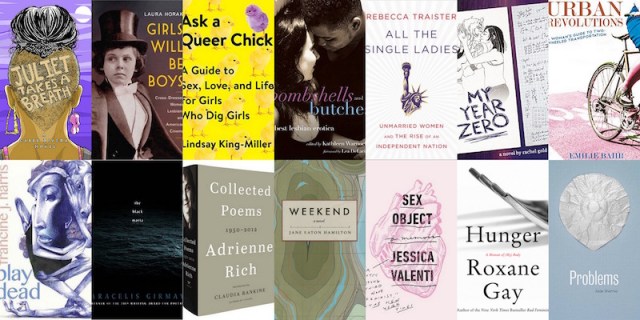
Juliet Takes a Breath, by Gabby Rivera: Juliet Milagros Palante is leaving the Bronx and the mother who, since Juliet came out, might never speak to her again for an internship with a queer feminist author in Portland, Oregon. This debut YA novel from Autostraddle editor Gabby Rivera tells what happens when coming out doesn’t go well — and when running away from your problems looks a lot like solving them. In anticipation, check out Gabby’s writing in our archives. (January 29)
Girls Will Be Boys: Cross-Dressed Women, Lesbians, and American Cinema, 1908-1934, by Laura Horak: Drawing on the early archives of American cinema, Horak questions the assumption that cross-dressing actresses were inherently transgressive. She also argues that cinema played a pivotal role in the representation of lesbian identity, and provides a new lens through which to view gender, sexuality and film. (January 29)
Ask a Queer Chick: A Guide to Sex, Love, and Life for Girls Who Dig Girls, by Lindsay King-Miller: This advice book by long-running Hairpin advice columnist King-Miller covers the range between coming out, your first gay haircut, your first gay wedding and more. (February 2)
Bombshells and Butches: Best Lesbian Erotica, edited by Kathleen Warnock: The latest erotica collection from long-time erotica editor Warnock features all sorts of sex among all sorts of women and people, in places from bars to kitchens to beds to flowerbeds, as well as an introduction by Orange Is the New Black‘s Lea DeLaria. (February 5)
All the Single Ladies: Unmarried Women and the Rise of an Independent Nation, by Rebecca Traister: “[H]istorically, when women were given options beyond early heterosexual marriage, the results were massive social change — temperance, abolition, secondary education, and more.” Traister explores the role of unmarried women across class, race and sexual orientation in radical change in America in this exhaustively researched volume. (March 1)
My Year Zero, by Rachel Gold: Lauren thinks that getting a girlfriend and getting better at school will fix her life, but things get complicated when she meets Sierra and Blake. Gold addresses dealing with mental illness and being out at 16 with her signature empathy and finesse. (March 29)
Urban Revolutions: A Woman’s Guide to Two-Wheeled Transportation, by Emilie Bahr: Cyclist and transportation planner Bahr writes about bike-friendly cities, what makes bicycling a women’s issue, how environments shape opportunities and more in this practical discussion of urban bicycling. (April 12)
play dead, by Francine J. Harris: Harris chronicles sex, rape, addiction, suicide, Detroit and the “too-little-discussed trials and dangers women face” in this raw poetry collection. (April 12)
The Black Maria, by Aracelis Girmay: In her latest collection, 2015 Whiting Award for Poetry winner Girmay examines the African diaspora, racism within American culture and human identity. (April 12)
Collected Poems: 1950-2012, by Adrienne Rich: Rich is one of the most prolific and influential poets of our time, queer or otherwise, and is notable for her examinations of gender, race and class through poetry. This volume, featuring an introduction by Claudia Rankine, brings together every single poem in her oeuvre, including Diving Into the Wreck and Atlas of the Difficult World. (April 16)
Weekend, by Jane Eaton Hamilton: Two lesbian couples living side-by-side for the summer investigate the crossroads of their relationships, as well as trust, negotiation, what isn’t worth keeping and what is. (May 10)
Sex Object: A Memoir, by Jessica Valenti: “[It]t’s a memoir about growing up in a culture that values women based on whether or not they’re sexy, but hates them for having sex. And, more broadly, my experience of trying to find my humanity and sanity in a culture that doesn’t really see women as full people,” says notable feminist Valenti of her forthcoming memoir at the Cut. (June 7)
I’m Just a Person, by Tig Notaro: A new memoir from notable and hilarious comedian Notaro examines the year she got C. diff, her mother died, she had a breakup and was diagnosed with bilateral breast cancer. Combining silliness and vulnerability, she brings readers along into the dark and out of it. (June 14)
Hunger: A Memoir of (My) Body, by Roxane Gay: An anticipated memoir from the author of Bad Feminist and An Untamed State, in Hunger Gay is “trying to balance liking myself and hating my body and wanting to feel comfortable in my body and believing that we need to, as a culture, do some serious work in changing our expectations for human bodies” and more. (June 14)
Problems, by Jade Sharma: Sharma’s debut novel is also the first book in Emily Books’s imprint with Coffee House Press. Following Maya as her life falls apart, it “takes every tired trope about addiction and recovery, ‘likeable’ characters, and redemption narratives, and blows them to pieces.” (July 5)
* This list is dude-free but please talk to me about Lin-Manuel Miranda’s Hamilton: The Revolution, coming in April, anyway.
What queer/ feminist books are you excited about this winter/spring? Tell us in the comments!
‘The Lives They Lived’ Includes Sally Ride And Other Legendary Queers
Fonseca’s Team Pick:
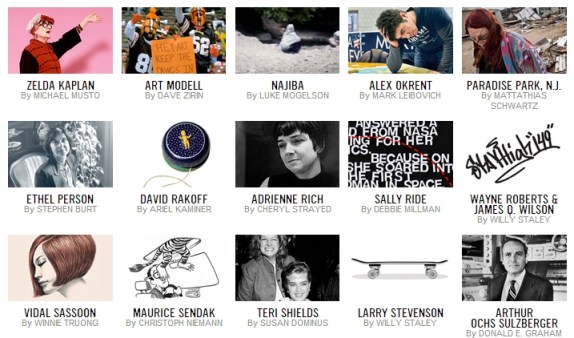
The Lives They Lived
In 2012, death claimed yet another handful of the world’s best and brightest artists, scientists, and activists. The New York Times’ The Lives They Lived virtual exhibit pays homage to 34 of these beautiful minds, as well as those lost in the Newtown shooting and several natural disasters. This is something I’d recommend viewing in the comfort of your own home, unless you’re as cool with shamelessly weeping in public as I am.
The creative medium varies from subject to subject — there are films, collages, sketches, mixed-media projects, and essays. Several queer and feminist legends are featured in the exhibit, including poet Adrienne Rich, iconic hairdresser Vidal Sassoon, and astronaut Sally Ride.
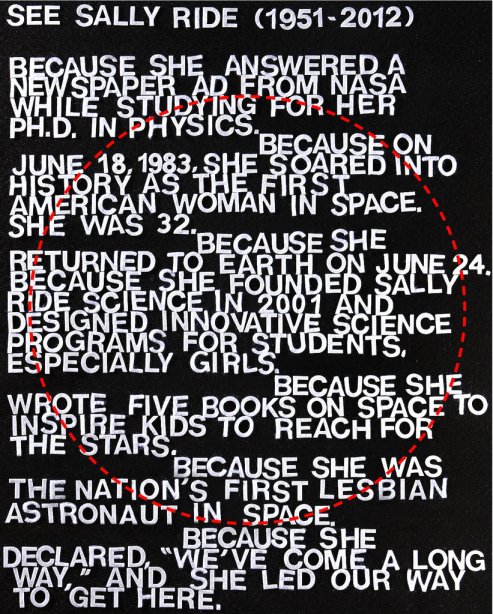
Soft sculpture using felt typography, fabric and computer graphics by Debbie Millman
My favorite piece in the Lives They Lived collection is an essay by Sandra Cisneros on the little-known lesbian and GRAMMY-winning musician Chavela Vargas. Born Isabel Vargas Lizano in 1919, she ran away from Costa Rica at the tender age of 14, her sights set on the newly liberated Mexico.
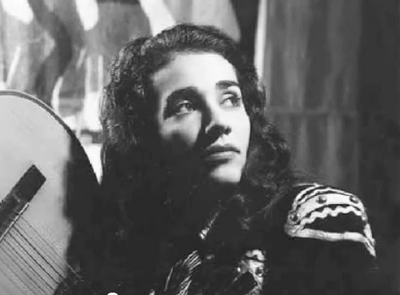
Chavela Vargas
Despite getting her start working a laundry list of odd jobs, Vargas’ ascent began when she caught the eye of none other than Frida Khalo.
“Who’s that girl, the one in the white shirt?” Kahlo asked. Kahlo summoned her over, and Vargas sat at her side the rest of the night. Because Vargas lived all the way up in the Condesa neighborhood, Rivera and Kahlo offered her lodging for the night. Rivera suggested she take to bed some of their Mexican hairless dogs. “Sleep with them,” he told her. “They warm the bed and keep away rheumatism.” Vargas had found her spiritual family.
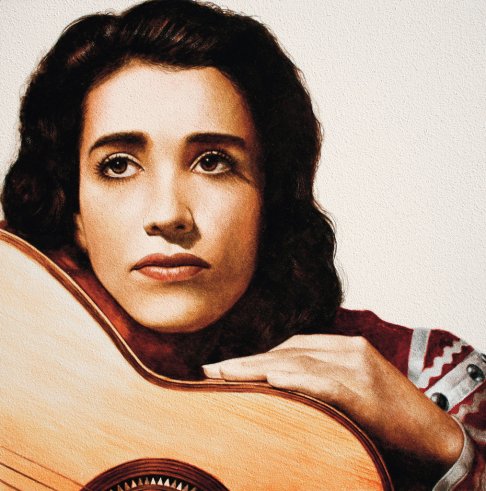
Illustration by Ali Cavanaugh
Described as being “chile verde” by Mexican author Elena Poniatowska, Vargas found mentorship in Agustín Lara, Antonio Bribiesca, and Lydia Mendoza. With talent, good looks, and penchants for motorcycles, pants, gringas, and alcohol, Vargas was every bit a womanizer as one can imagine.
In a Mexico City club, Vargas serenaded a couple. Then she slipped off the man’s tie, lassoed it around his woman’s neck, gave it a passionate yank and kissed her.
She had a reputation as a robaesposas. Did she really have affairs with everyone’s wives? A European queen? Ava Gardner? Frida? What was true, and what was mitote? You only have to look at Vargas’s photos when she was young to know some of the talk was true. In the town of Monclova, Coahuila, go ask the elders. They’ll tell you: Vargas came to town and sang. And then ran off with the doctor’s daughter. People still remember.
Her big hit was “Macorina,” Poniatowska said. “ ‘Put your hand here, Macorina,’ she sang with her hand like a great big seashell over her sex, long before Madonna.”
You can read more about Vargas here, and listen to “Macorina” here:
[youtube https://www.youtube.com/watch?v=cF6jEclOMcw?feature=player_detailpage]
You Should Go: Lesbian Herstory Archives Marathon Reading – Audre Lorde and Adrienne Rich
Feature image by Kathryn Kendall via the Lesbian Herstory Archives
The Lesbian Herstory Archives will be hosting a marathon reading this Saturday, November 17, from 12pm-12am to celebrate Audre Lorde and Adrienne Rich, “whose work and presence as poets, theorists, activists and teachers inspired decades of anti-racist, feminist, and lesbian feminist thought and activism.” Each hour will be facilitated by a different organization, who will read from their poetry and essays, as well as Audre Lorde’s biomythography, Zami, and Adrienne Rich’s autobiographical reflections, Institution of Motherhood. The event organizers also encourage people to share their memories and thoughts, so that in celebrating these two important, remarkable women, we can also celebrate the impact they have had and continue to have on our community.

via the Lesbian Herstory Archives
According to event organizer Shawn Smith, the response so far has been incredible. “People have been extremely excited to convene at the Archives, sit with other lesbians, friends, families, women who were there, women who were affected, and read from the words of Audre and Adrienne,” she said. “We received an email from Adrienne Rich’s son thanking us for doing the event. This is after receiving a phone message and letter from Audre Lorde’s daughter, thanking us for placing her mother’s collection in the care that it deserves, and for the hard work that we do.”
Smith expects a “renewed relevance to arise” through the merging of community voices with the voices of Lorde and Rich. One of the most exciting parts of the event, she said, is that original audio clips from the LHA collection will be played at the beginning of each hour, featuring the writers reading their own work.
Event organizer Alexis Clements adds that she’s hoping the event will give her and everyone who attends the opportunity to gain an intimate, personal understanding of Lorde and Rich through the personal testimonies of people who knew them. “I really crave that deeper sense of people’s humanity these days,” she said. “Not necessarily ‘warts and all,’ more like, don’t forget they laughed and loved and had families and made mistakes while they were fighting.”
Some of those personal testimonies will come from LHA co-founders Joan Nestle and Deb Edel. According to Smith, “Although Joan is in Australia, she wrote a very personalized essay which will be read in the first hour detailing her personal experiences with Audre Lorde and Adrienne Rich, and how they were each instrumental to the curation of the Archives in the early days… Joan describes Audre’s donation of boxes that were pulled from under her mattress, while Audre’s at the time, very young son waited quietly by the door, peeking in.”
Other facilitators include SAGE, members of the Archives’ own Lesbian Studies Class, In The Flesh Magazine, Black Women’s Blueprint, Alicia Anabel Santos and New York City Latina Writer’s Group, The Belladonna Series, R. Erica Doyle, brooklyn boihood, Rivers of Honey, Kelli Dunham and Queer Memoir. The full schedule is on the event page, so if you are like me and unlikely to appear anywhere at noon on a Saturday, you can figure out which facilitators you want to arrive in time for.
There were approximately 60 cute, nice Autostraddlers at the meet-up at the LHA last month, most of whom had never been to the Archives. If that many of you showed up to watch me overcome my fear of public speaking to give a tour to more people than I ever have before (ok, maybe you didn’t know that’s what you’d be getting, but it’s what you got, so), think about how great THIS event will be! According to Clements, many of the people associated with the event have never been to the Archives before either, so it’s going to be a great opportunity to build community.
There’s a suggested donation of $5-$10 at the door, but no one will be turned away. The organizers hope to raise three thousand dollars for the Archives, which is an all-volunteer organization that needs funds to preserve and digitize its artifacts. “Both Audre and Adrienne have been advocates of the LHA’s existence, the preservation of lesbian herstory, and the space as a home for us to share our stories,” said Smith, and in that spirit, the Lesbian Herstory Archives is as much a part of the event as the women being honored. Clements added, “Every time I’m there I am reminded of the fact that the simple act of preserving and displaying this herstory is a steadfastly political act, particularly in a society that in so many ways works so hard to diminish the lives and voices of women.”
You can visit the event page for more information, and RSVP on Facebook (but you don’t need a Facebook to come). I hope to see you there!
The Lesbian Herstory Archives is located at 484 14th Street, Brooklyn, NY 11215.
Adrienne Rich is Dead
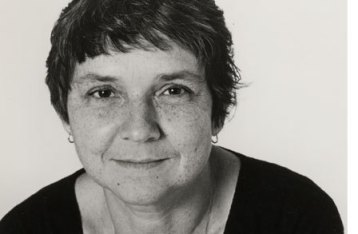
Adrienne Rich was born in Baltimore in 1929. Rich’s father was a pathologist who cultivated his daughter’s early affections for literature and her mother was a concert pianist who’d given up her career in favor of marriage and child-rearing.
Adrienne Rich would eventually go on to study at Radcliffe (Harvard’s college for women at the time), where all of her teachers were men and one of them was W.H. Auden. Auden praised the poems in 21-year-old Rich’s first volume of poetry, A Change of World (1951), as “neatly and modestly dressed, speak quietly but do not mumble, respect their elders but are not cowed by them.”
Adrienne Rich remained, as she grew up, neat and modestly dressed. But she ceased speaking quietly, instead becoming one of the most influential poets and thinkers of the 20th century, known for her radical feminist politics, anti-war activism, literary prowess and contributions to lesbian scholarship and discourse. During a time when women’s liberation seemed focused solely on the needs of white middle-class straight women, Rich was uniquely outspoken on the importance of issues facing lesbians and women of color.
All of us — especially all of us here, the queers and the women — are indebted to Adrienne Rich and all the words she wrote and spoke during her 82 years on earth. Yesterday, March 27, 2012, was the last day of those 82 years.
She died + a famous woman+ denying
her wounds
denying
her wounds + came + from the same source as her power
– from “Power” (The Dream of a Common Language)
In The New York Times Book Review, Carol Muske wrote of Rich that she began as a “polite copyist of Yeats and Auden, wife and mother. She has progressed in life (and in her poems …) from young widow and disenchanted formalist, to spiritual and rhetorical convalescent, to feminist leader…and doyenne of a newly-defined female literature.
**
“The connections between and among women are the most feared, the most problematic, and the most potentially transforming force on the planet.”
**
Before sitting down to write this, I decided to do a quick scan of my personal library to see what Adrienne Rich writings I had on hand to pull from and I realized that I didn’t know where to start looking. See, Adrienne Rich is just so awesomely and uniquely prolific. My books are arranged by genre and Rich could be anywhere on those shelves — Poetry, Feminism, Queer Theory, About Writing, Essay Anthologies. She just did so many things. I’ve read Adrienne Rich’s work in at least three entirely unrelated college courses and like Rich, I’m a Jewish feminist lesbian writer who cares about literature and also about social justice. So she comes up a lot.
The first thing I found was a copy of The Dream of a Common Language (Poems 1974-1977). My friend Meg gave it to me twelve or so years ago, when I was living in Michigan and she was still living in New York. My copy is an early printing (1978, I think), bound and covered in tan cardstock with the title and other relevant information printed in large, understated red and black letters.
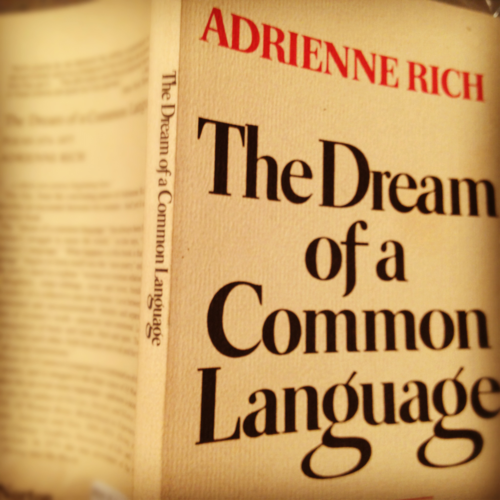
Meg stuck a post-it note on page 23 for me, and it’s still there:
“I thought you might like these ’21 Love Poems.’ I like some of these other ones too. I hope you do. Hope you don’t mind used edition, but obviously cheaper. There’s a good used bookstore on 12th street right next to where I work…. dangerous. xo meg”
I did like the 21 love poems and many of the other ones, too.
Rain on the West Side Highway,
red light at Riverside:
the more I live the more I think
two people together is a miracle.
– from Love Poem XVIII (The Dream of a Common Language)
Then mostly I just found things here and there — like her 1984 essay “Notes Toward a Politics of Location,” included in The Essential Feminist Reader. The intro describes the essay like so: “In this essay, Rich acknowledged her own ‘politics of location’ as a North American, white, jewish lesbian, and she criticized ‘the faceless raceless classless category of all women as a creation of white, western, self-centered women.”
**
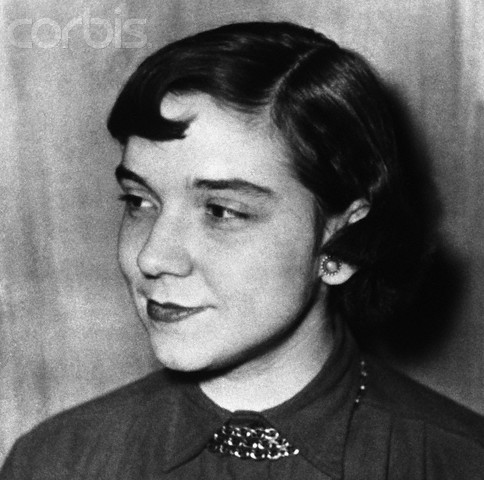
A portrait of Adrienne Cecile Rich (1950s)
Adrienne Rich got married in 1953 to a Harvard economics professor named Alfred, and consequentially birthed three sons. Rich was gifted grant after grant after award after grant after Guggenheim Fellowship. She published her second volume of poetry, The Diamond Cutters, in 1955, but she hates that book now.
She felt weird about her life back then, like how she’d gotten married and had babies and yet lacked all the accompanying feelings society had promised her went along with marriage and babies.
**
“My children cause me the most exquisite suffering. It is the suffering of ambivalence: the murderous alternation between bitter resentment and raw-edged nerves, and blissful gratification and tenderness. Sometimes I seem to myself, in my feelings toward these tiny guiltless beings, a monster of selfishness and intolerance.”
– Adrienne Rich’s journal, 1960
**
In 1966, the family moved to New York City. By this point Rich was becoming increasingly politically and socially conscious, both as a woman and simply as a citizen, and while teaching at Columbia University she got heavily entrenched in the New Left activity happening at the time. In addition to publishing in feminist journals, she participated in various political actions and threw fundraising parties for The Black Panthers and anti-Vietnam protestors. Her husband was okay with her political passion at first and then less okay with it. He told his friends that Adrienne was losing her mind and was “becoming a very pronounced, very militant feminist.” They divorced. Shortly thereafter, Alfred drove into the woods with a gun and committed suicide. Rich and her children were devastated.
**
“in the nineteenth year and the eleventh month
speak your tattered Kaddish for all suicides:
Praise to life though it crumbled in like a tunnel
on ones we knew and loved
Praise to life though its windows blew shut
on the breathing-room of ones we knew and loved
Praise to life though ones we knew and loved
loved it badly, too well, and not enough
Praise to life though it tightened like a knot
on the hearts of ones we thought we knew loved us
Praise to life giving room and reason
to ones we knew and loved who felt unpraisable.
Praise to them, how they loved it, when they could.”
― “Tattered Kaddish”
**
The Guardian in 2002 wrote of what happened next: “For many, the revelation that [Rich] was a lesbian came as a shock. Observant readers of Rich’s work, however, would have noted that, as early as A Change of World , a poem called “Stepping Backward” had dealt with breaking off a close female relationship.”
She kept on publishing: Necessities of Life in 1966, Leaflets in 1969. 1973’s Diving into the Wreck, which won the National Book Award in 1974, is perhaps her most celebrated volume of poetry.
**
The only real love I have ever felt
was for children and other women
everything else was lust, pity,
self-hatred, pity, lust
– from “The Phenomenology of Anger” (Diving into the Wreck)
**
Rich and Allen Ginsberg shared the National Book Award that year, but Rich refused to accept her award individually, and instead brought up fellow nominees Alice Walker and Audre Lorde with her to accept “on behalf of all women.”
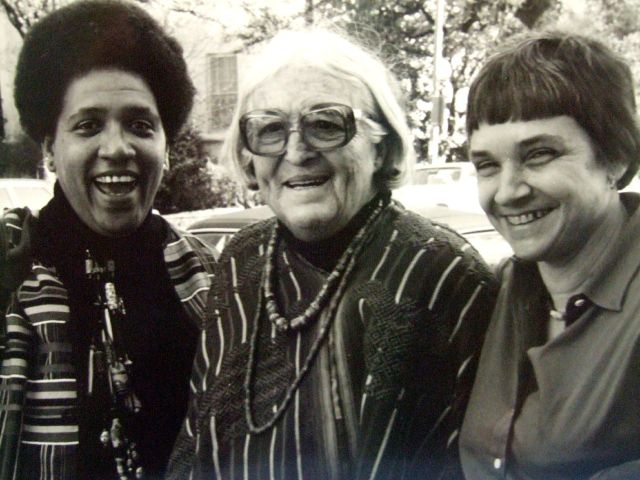
Audre Lorde, Meridel Le Sueur, Adrienne Rich (1980)
In 1976, Rich met Michelle Cliff, a Jamaican-born novelist and editor who would remain Rich’s partner for life. Rich by then was churning out some world-changing shit, like Compulsory Heterosexuality and Lesbian Existence, a pioneering work that focused on “how and why women’s choice of women as passionate comrades, life partners, co-workers, lovers, community, has been crushed, invalidated, forced into hiding.”
**
“[Responsibility to yourself] means resisting the forces in society which say that women should be nice, play safe, have low professional expectations, drown in love and forget about work, live through others, and stay in the places assigned to us. It means that we insist on a life of meaningful work, insist that work be as meaningful as love and friendship in our lives.”
-Adrienne Rich, “Claiming an Education“
**
She published the controversial and widely influential Of Women Born: Motherhood as Experience and Institution in 1976. There, she described her lesbianism as both political and personal, writing of her sexual evolution: “the suppressed lesbian I had been carrying in me since adolescence began to stretch her limbs.”
She wrote more books of poetry, like Twenty-One Love Poems, which was more like a “pamphlet” and ultimately was folded into the book I have, The Dream of a Common Language. In 1979 she published On Lies, Secrets and Silence: Selected Prose, 1966-1978.
**
Men have been expected to tell the truth about facts, not about feelings. They have not been expected to talk about feelings at all.
Yet even about facts they have continually lied.
We assume that politicians are without honor. We read their statements trying to crack the code. The scandals of their politics: not that men in high places lie, only that they do so with such indifference, so endlessly, still expecting to be believed. We are accustomed to the contempt inherent in the political lie…
Lying is done with words, and also with silence.
– “Women and Honor: Some Notes on Lying”
**
I had that book — On Lies, Secrets and Silence — but I can’t find it today. I must have lent it to somebody. I remember transcribing big chunks of it for the straight girl I was sleeping with, using Rich’s words to make some kind of passive-aggressive point. I wish I still had it.
**
Cliff and Rich eventually relocated to Santa Cruz, where the couple took over the editorship of lesbian journal Sinister Wisdom. Then more teaching, and more writing: six years at Cornell, three volumes of poetry, more prizes, more grants.
She started Bridges: A Journal for Jewish Feminists and Our Friends in 1990 and became active on the advisory boards of the Boston Woman’s Fund, National Writers Union and Sisterhood in Support of Sisters in South Africa.
**
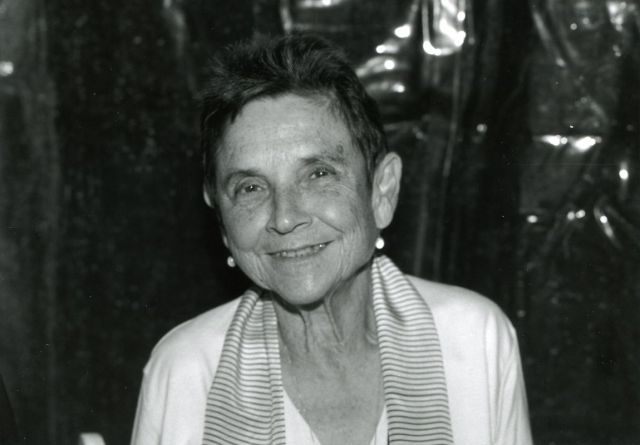
“We [poets] may feel bitterly how little our poems can do in the face of seemingly out-of-control technological power and seemingly limitless corporate greed, yet it has always been true that poetry can break isolation, show us to ourselves when we are outlawed or made invisible, remind us of beauty where no beauty seems possible, remind us of kinship where all is represented as separation.”
**
In 1994 she received the MacArthur “Genius Grant” and in 1997, Rich was awarded The National Medal for the Arts but famously turned it down in protest against the House of Representative’s vote to end the National Endowment for the Arts. She has said of that choice: “I am not against government in general, but I am against a government where so much power is concentrated in so few hands.”
She told President Clinton, in a letter: “The radical disparities of wealth and power in America are widening at a devastating rate. A president cannot meaningfully honor certain token artists while the people at large are so dishonored.”
Rich continued publishing poetry and essays, like 1981’s A Wild Patience Has Taken Me This Far and 2001’s The Fact of a Doorframe. She continued participating in anti-war efforts, and became a chancellor of the board of the Academy of American Poets.
I could write about her all day. I’ve already written 1964 words, this is already too long, and all I’ve done so far is lay out the facts. I’ve not yet gotten into the feelings. She was such a good woman, so uncompromising in her politics, so dedicated to her work. But this is already too long, and I’ve only just gotten started.
**
At twenty, yes: we thought we’d live forever.
At forty-five, I want to know even our limits.
I touch you knowing we weren’t born tomorrow,
and somehow, each of us will help the other live,
and somewhere, each of us must help the other die.
– From “Love Poem III”
**
Pure Poetry #30: These Poems Are Gay, Just Like You
Pure Poetry Week(s):
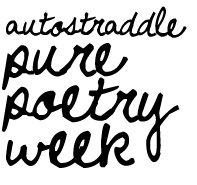
#1 – 2/23/2011 – Intro & Def Poetry Jam, by Riese
#2 – 2/23/2011 – Eileen Myles, by Carmen
#3 – 2/23/2011 – Anis Mojgani, by Crystal
#4 – 2/24/2011 – Andrea Gibson, by Carmen & Katrina/KC Danger
#5 – 2/25/2011 – Leonard Cohen, by Crystal
#6 – 2/25/2011 – Staceyann Chin, by Carmen
#7 – 2/25/2011 – e.e. cummings, by Intern Emily
#8 – 2/27/2011 – Louise Glück, by Lindsay
#9 – 2/28/2011 – Shel Silverstein, by Intern Lily & Guest
#10 – 2/28/2011 – Michelle Tea, by Laneia
#11 – 2/28/2011 – Saul Williams, by Katrina Chicklett Danger
#12 – 3/2/2011 – Maya Angelou, by Laneia
#13 – 3/4/2011 – Jack Spicer, by Riese
#14 – 3/5/2011 – Diane DiPrima, by Sady Doyle
#15 – 3/6/2011 – Pablo Neruda, by Intern Laura
#16 – 3/7/2011 – Vanessa Hidary, by Lindsay
#17 – 3/7/2011 – Adrienne Rich, by Taylor
#18 – 3/8/2011 – Raymond Carver, by Riese
#19 – 3/9/2011 – Rock WILK, by Gabrielle
#20 – 3/9/2011 – Veronica Franco, by Queerie Bradshaw
#22 – 3/12/2011 – William Carlos Williams & Robert Creeley, by Becky
#23 – 3/13/2011 – NSFW Sunday is Pure Poetry Edition, by Riese
#24 – 3/14/2011 – Charles Bukowski, by Intern Emily
#25 – 3/16/2011 – Rainer Maria Rilke, by Riese
#26 – 3/17/2011 – Lee Harwood by Mari
#27 – 3/18/2011 – Jeffrey McDaniel by Julieanne
#28 – 3/20/2011 – Dorothy Porter by Julia
#29 – 3/21/2011 – Sylvia Plath, by Riese
#30 – 3/24/2011 – Poems About Being a Homogay, by Riese
![]()
Today’s special edition of Pure Poetry contains a variety of poems from lots of different lesbos, a bisexual or two and one dude about the experience of being a giant lez. For more on lesbian poets, check out Ten Lesbian & Bisexual Poets To Fall in Love With.
![]()
For The Straight Folks Who Don’t Mind Gays But Wish They Weren’t So Blatant
by Pat Parker

You know, some people got a lot of nerve.
Sometimes I don’t believe the things I see and hear.
Have you met the woman who’s shocked by two women kissing
and in the same breath, tells you she is pregnant?
BUT gays, shouldn’t be so blatant.
Or this straight couple sits next to you in a movie and
you can’t hear the dialogue because of the sound effects.
BUT gays shouldn’t be so blatant.
And the woman in your office spends an entire lunch hour
talking about her new bikini drawers and how much
her husband likes them.
BUT gays shouldn’t be so blatant.
Or the “hip” chick in your class rattling like a mile a minute
while you’re trying to get stoned in the john, about the
camping trip she took with her musician boyfriend.
BUT gays shouldn’t be so blatant.
You go in a public bathroom and all over the walls there’s John loves
Mary, Janice digs Richard, Pepe loves Delores, etc., etc.
BUT gays shouldn’t be so blatant.
Or you go to an amusement park and there’s a tunnel of love
and pictures of straights painted on the front and grinning
couples are coming in and out.
BUT gays shouldn’t be so blatant.
Fact is, blatant heterosexuals are all over the place.
Supermarkets, movies, on your job, in church, in books, on television every day
day and night, every place-even- in gay bars and they want gay
men and woman to go and hide in the closet.
So to you straight folks I say, “Sure, I’ll go if you go too”
BUT I’m polite so, after you.
![]()
personal ad
from Pelt, by Daphne Gottlieb
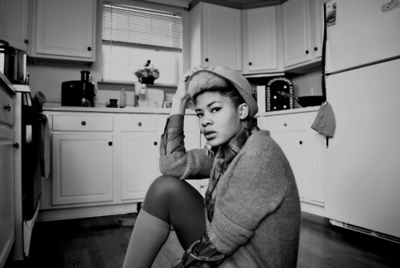
via queerbrownxx.tumblr.com
Your anatomy
could be
our destiny.
You have:
2 aorta
hot, red and sweet
2 ventricles
that suck and pump;
4 chambers
that make
you throb
inside.
Make a fist.
They say your fist
is roughly
the size of your heart.
I’m looking for
the well-hung woman.
![]()
Changing What We Mean
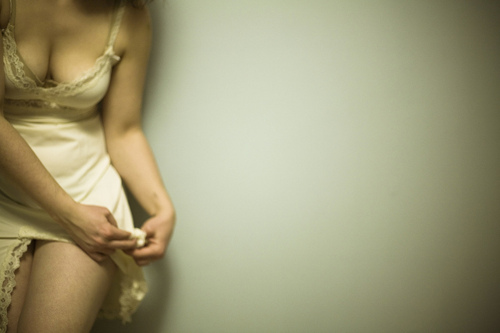
Turning your back, you button your blouse. That’s new.
You redirect the conversation. A man
has entered it. Your therapist has given you
permission to discuss this with me, the word
you’ve been looking for in desire.
You can now say “heterosexual” with me. We mean
different things when we say it. I mean
the life I left behind forever. For you, it’s a new
beginning, a stab at being normal again, a desire
to enter the world with a man
instead of a woman, and of course, there’s the word
you won’t claim for yourself anymore, you
who have children to think of, you
who have put me in line behind them and mean
to keep the order clear. It’s really my word
against yours anymore in this new
language, in this battle over how a man
is about to enter this closed room of desire
we’ve gingerly exchanged keys to, but desire
isn’t what’s at issue anyway, you
say to me. Instead I learn a man
can protect you in a way a woman only means
to but never can, and my world is too new
when there’s real life out there, word
after word for how normal looks, each word
cutting like scissors a profile of desire—
a man facing a woman, nothing particularly new
or interesting to me. I’ve wanted only to face you
and the world simultaneously, say what I mean
with my body, my choice to not be a man,
to be a woman with you, forget the man’s
part or how his body is the word
for what touch can contain, what love means.
If this were only about desire,
you say, I’d still desire you.
But it isn’t passion we’re defining, new
consequences emerge when a man and desire
are part of the words we hurl, you
changing how you mean loving—this terrible final news.
![]()
A private public space
by Bob Hicok
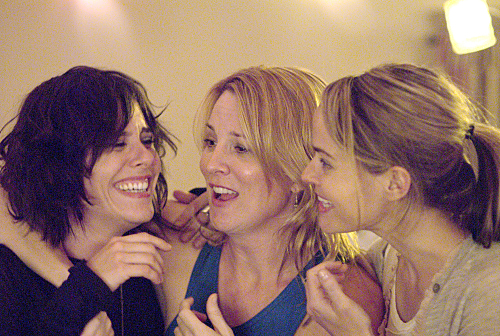
You can’t trust lesbians. You invite them
to your party and they don’t come,
they’re too busy tending vaginal
flowers, hating football, walking their golden
and chocolate labs. X gave me a poem
in which she was in love with a woman
and the church but the church
couldn’t accept four breasts in one bed.
When I asked if our coworkers knew,
she dropped her head and I said nothing
for years until this morning I realized
no one reads poems: my secrets and hers
are safe in verse. I knew she’d have enjoyed
the Beaujolais and I want to meet Dianne,
Mona Lisa, Betty, Alice,
the name’s been changed
to protect women who can’t stand in a room
holding hands because you can’t trust
heterosexuals to love love, however
it comes. So I recorded
the party for her, for them, the mic
a bit away from the action
to catch the feel of waves touching shore
and letting go, the wash of moods
across the hours of drink and yes, some grapes
were thrown and I breathed
the quickening revelation
of a cigarette, someone said “I gave up
underwear for Lent” and I hope
they play the tape while making love.
As if finally the world’s made happy
by who they are, laughing with, not at
the nipple lick clit kiss hug
in bed and after, the on and on
of meals and moons and bills
and burning days of pretending
they don’t exist. “Who’s she? Just
a friend.” And oceans are merely dew
upon the land.
![]()
The Floating Poem, Unnumbered
from The Dream of a Common Language by Adrienne Rich
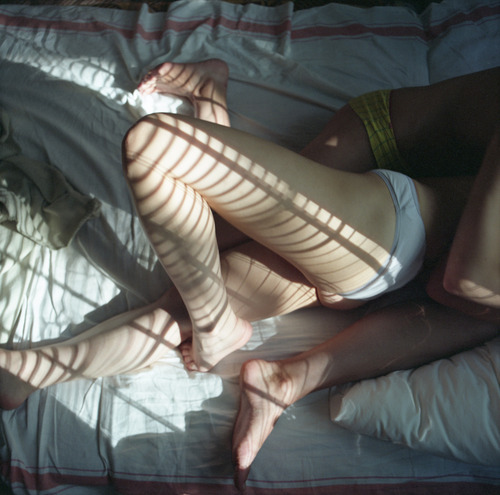
Whatever happens with us, your body
will haunt mine — tender, delicate
your lovemaking, like the half-curled frond
of the fiddlehead fern in forests
just washed by sun. Your traveled, generous thighs
between which my whole face has come and come —
the innocence and wisdom of the place my tongue has found there —
the live, insatiable dance of your nipples in my mouth —
your touch on me, firm, protective, searching
me out, your strong tongue and slender fingers
reaching where I had been waiting years for you
in my rose-wet cave–whatever happens, this is.
![]()
First Fig
by Edna St. Vincent Millay
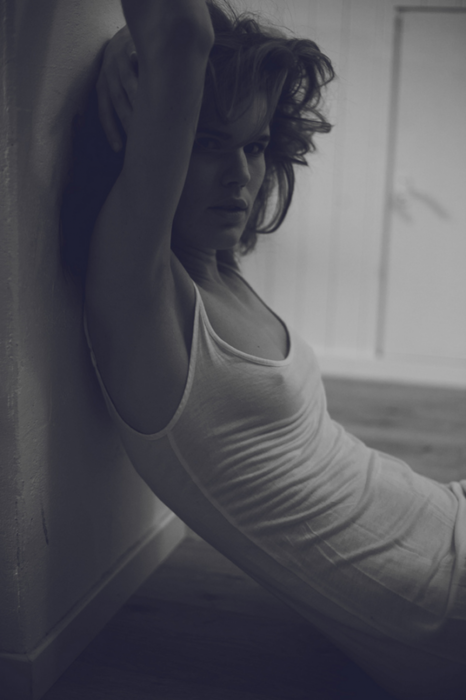
My candle burns at both ends;
It will not last the night;
But ah, my foes, and oh, my friends—
It gives a lovely light!
![]()
We Could Be Soulmates
from The Beautiful by Michelle Tea
hey now tall girl
aren’t you bored
all by yourself in your mess room
smoking pot till your head spins
out of your pillow
don’t you want to be my
sister we can cut
ourselves open and
share what’s inside smear it
altogether so there’s a forever
with my name sliding through
your veins we could be
bloodsisters like two sweaty girls
in a backyard hideout you know
it might sound catholic or
it might sound cliche but you
look like the virgin to me and
i want to be that holy child
chewing at your nipple
i’ve seen you m
moving down valencia your
sharp bones poking at your clothes
when you walk it looks like dancin’ and
hey there tall girl
don’t you know you
sucked the heart right
out of my throat
this is serious
we could be soulmates you
are in my dreams like destiny
got me tossing back shots of whiskey shots
of scotch trying
to get back
to the taste
of your
teeth
i’m waxing alcoholic, trying
to get back to the smell
of your mouth
breathe it into my face
like a kind of masturbation
tall girl don’t you know
not to be givin’ tattoos with
your eyes and when you
curl those lips like
the most perfect wave i
wish i was a surfer,
i’m not even blonde i
found a recipe for desperate seduction
in the back of this book you need
cinnamon ground antler and the
pulverized eggshell of an
infertile dove but
it’s enough to call out prayers
for the accident of seeing you
on the street your tall head poking
the sky hey there
tall girl
don’t you want a sister or
at least a cup of
coffee?
![]()
Sappho’s Reply
by Rita Mae Brown
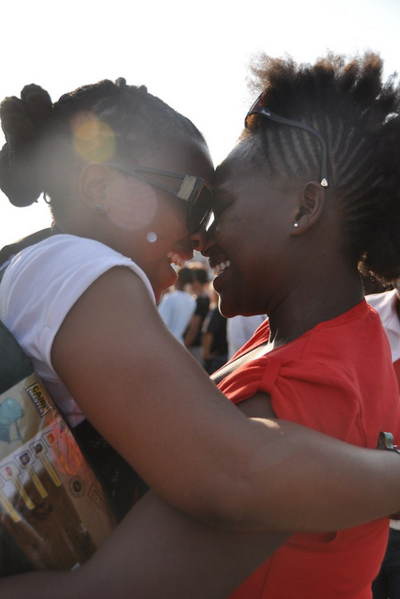
My voice rings down through thousands of years
To coil around your body and give you strength,
You who have wept in direct sunlight,
Who have hungered in invisible chains
Tremble to the cadence of my legacy:
An army of lovers shall not fail.
![]()
from If Not, Winter: Fragments of Sappho
translated by Ann Carson
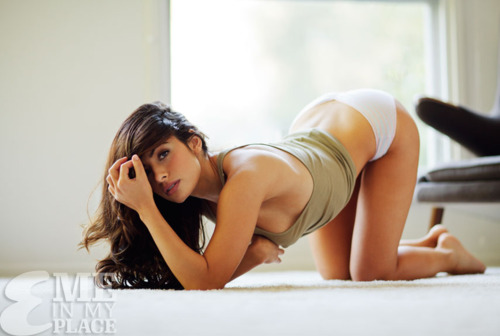
] of desire
]
] for when I look at you
] such a Hermione
] and to yellowhaired Helen I liken you
]
] among mortal women, know this
] from every care
] you could release me
]
] dewy riverbanks
] to last all night long
[]
Pure Poetry #17: Adrienne Rich Came to Explore the Wreck
Pure Poetry Week(s):

#1 – 2/23/2011 – Intro & Def Poetry Jam, by Riese
#2 – 2/23/2011 – Eileen Myles, by Carmen
#3 – 2/23/2011 – Anis Mojgani, by Crystal
#4 – 2/24/2011 – Andrea Gibson, by Carmen & Katrina/KC Danger
#5 – 2/25/2011 – Leonard Cohen, by Crystal
#6 – 2/25/2011 – Staceyann Chin, by Carmen
#7 – 2/25/2011 – e.e. cummings, by Intern Emily
#8 – 2/27/2011 – Louise Glück, by Lindsay
#9 – 2/28/2011 – Shel Silverstein, by Intern Lily & Guest
#10 – 2/28/2011 – Michelle Tea, by Laneia
#11 – 2/28/2011 – Saul Williams, by Katrina Chicklett Danger
#12 – 3/2/2011 – Maya Angelou, by Laneia
#13 – 3/4/2011 – Jack Spicer, by Riese
#14 – 3/5/2011 – Diane DiPrima, by Sady Doyle
#15 – 3/6/2011 – Pablo Neruda, by Intern Laura
#16 – 3/7/2011 – Vanessa Hidary, by Lindsay
#17 – 3/7/2011 – Adrienne Rich, by Taylor
![]()
Did I ever walk the morning streets at twenty,
my limbs streaming with a purer joy?
I don’t remember when or how I started reading Adrienne Rich, but I’ll fill in the gaps because they’re just as true. I know it was my first year of college, might as well have been on a crisp blue fall day walking across Washington Square Park. Everything was across the park since I lived on the West side, and the fountain was a stone bowl collecting leaves.
I carried this worn little 1978 copy of The Dream of a Common Language that I’d scooped up at the used book store near Union Square and taken home to nurse. The book was well-worn before it came to me, emanating an odd, potent kind of energy from the minute I picked it up. The copy had been handled by a stranger for so long it had become a trapdoor to someone else’s interior experience altogether. I carried it with me, adding dog-ears to dog-ears, pencil to what was written in pen.
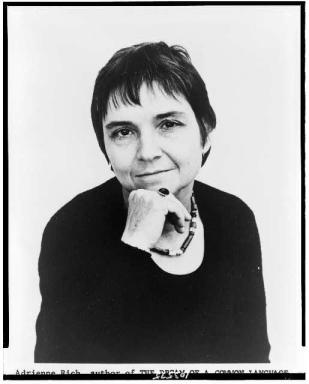 A year or two later, I met Rich at a reading in New York. She was a tiny woman with a body that folded into itself with age, but her eyes were sharp and bright. I hate meeting anyone I have even a fleeting reverence for, for fear of rupturing the solipsistic uniquely yours quality that makes you wear their work on your sleeve, like a heart you didn’t write. I downed a few cups of too-thick syrah, clasped her tiny hand and said very little.
A year or two later, I met Rich at a reading in New York. She was a tiny woman with a body that folded into itself with age, but her eyes were sharp and bright. I hate meeting anyone I have even a fleeting reverence for, for fear of rupturing the solipsistic uniquely yours quality that makes you wear their work on your sleeve, like a heart you didn’t write. I downed a few cups of too-thick syrah, clasped her tiny hand and said very little.
I continued to take the train from Canal Street to 96th Street three times a week, employing all of strategies at my disposal to angle for a seat so I could enjoy the same poems for 34 minutes each way. Last year I moved to California with about five books, my first copy of The Dream of a Common Language among them, dog-eared and stuffed with the detritus of a different time.
My favorite poem is in a different collection of Rich entirely, another one, of course, very much worth owning:
“Diving Into the Wreck”
First having read the book of myths,
and loaded the camera,
and checked the edge of the knife-blade,
I put on
the body-armor of black rubber
the absurd flippers
the grave and awkward mask.
I am having to do this
not like Cousteau with his
assiduous team
aboard the sun-flooded schooner
but here alone.
There is a ladder.
The ladder is always there
hanging innocently
close to the side of the schooner.
We know what it is for,
we who have used it.
Otherwise
it is a piece of maritime floss
some sundry equipment.
I go down.
Rung after rung and still
the oxygen immerses me
the blue light
the clear atoms
of our human air.
I go down.
My flippers cripple me,
I crawl like an insect down the ladder
and there is no one
to tell me when the ocean
will begin.
First the air is blue and then
it is bluer and then green and then
black I am blacking out and yet
my mask is powerful
it pumps my blood with power
the sea is another story
the sea is not a question of power
I have to learn alone
to turn my body without force
in the deep element.
And now: it is easy to forget
what I came for
among so many who have always
lived here
swaying their crenellated fans
between the reefs
and besides
you breathe differently down here.
I came to explore the wreck.
The words are purposes.
The words are maps.
I came to see the damage that was done
and the treasures that prevail.
I stroke the beam of my lamp
slowly along the flank
of something more permanent
than fish or weed
the thing I came for:
the wreck and not the story of the wreck
the thing itself and not the myth
the drowned face always staring
toward the sun
the evidence of damage
worn by salt and away into this threadbare beauty
the ribs of the disaster
curving their assertion
among the tentative haunters.
This is the place.
And I am here, the mermaid whose dark hair
streams black, the merman in his armored body.
We circle silently
about the wreck
we dive into the hold.
I am she: I am he
whose drowned face sleeps with open eyes
whose breasts still bear the stress
whose silver, copper, vermeil cargo lies
obscurely inside barrels
half-wedged and left to rot
we are the half-destroyed instruments
that once held to a course
the water-eaten log
the fouled compass
We are, I am, you are
by cowardice or courage
the one who find our way
back to this scene
carrying a knife, a camera
a book of myths
in which
our names do not appear.
Gays and Honor: Some Truths About Lying
Men have been expected to tell the truth about facts, not about feelings. They have not been expected to talk about feelings at all.
Yet even about facts they have continually lied.
We assume that politicians are without honor. We read their statements trying to crack the code. The scandals of their politics: not that men in high places lie, only that they do so with such indifference, so endlessly, still expecting to be believed. We are accustomed to the contempt inherent in the political lie…
Lying is done with words, and also with silence.
– Adrienne Rich
Once upon a time, I was a terrible liar. It’s not that I tried and failed, because it’s actually pretty easy to successfully lie, ’cause people are too busy, generally, to take anything past face value. It’s that I couldn’t even try to lie.
Lying requires a detachment that I never mastered until getting into a line of work that thrust me, with unexpected force and surprising ease, into what could easily be described as “living a lie.” Consequently, I learned to lie.
Does a life “in the closet”–lying, perhaps of necessity, about ourselves to bosses, landlords, clients, colleagues, family, because the law and public opinion are founded on a lie–does this, can it, spread into private life, so that lying (described as discretion) becomes an easy way to avoid conflict or complication? Can it become a strategy so ingrained that it is used even with close friends and lovers?
Was lying easier than I’d expected? Yes. The art of lying was not hard to master, and I found myself suddenly capable of lying to anyone about anything, “friends and lovers” included. I suppose it happens to everyone in America or really any adult at all, sooner or later.
But the act of living with said lie, day in and day out, was exactly as challenging as I’d expected. It’s a sniper in the corner, a fortress that protects you from invaders but also blocks you from seeing anything, stops you from stepping forward, traps you.
In lying to others we end up lying to ourselves. We deny the importance of an event, or a person, and thus deprive ourselves of a part of our lives. Or we use one piece of the past or present to screen out another. Thus we lose faith even with our own lives.
I couldn’t really stand the lying, so I avoided people I had to lie to and eventually just started telling the truth with relative abandon. When I came across Adrienne Rich’s “Women and Honor: Some Notes on Lying,” it resonated and reinforced my decision that it would be fundamentally unethical for me to choose between truth and lying. The choice was to change my life into something I could be honest about, or stop lying. Eventually I chose the former.
Rich was talking about women’s relationships with other women, but the ideas are strong regardless of context — and because homophobia is rooted in gender discrimination, its context is relevant to DADT.
I started thinking about Adrienne Rich’s piece today as I was reading about Tuesday’s DADT hearing/dog-and-pony show, which was really just stacks of lies between liars lying about what they’re doing and why they’re doing it to please other liars and the lie-believers who vote for them.
I thought about the extent to which everything about our lives is basically built on lies and how it’s such a huge part of our culture that it’s literally not even worth mentioning. Isn’t that the only argument we need against DADT? If we’re worried about unit cohesion, isn’t honesty the best policy?
Truthfulness anywhere means a heightened complexity. But it is a movement into evolution. Women are only beginning to uncover our own truths; many of us would be grateful for some rest in that struggle, would be glad just to lie down with the shards we have painfully unearthed, and be satisfied with those. The politics worth having, the relationships worth having, demand that we delve still deeper.
Obviously Tuesday’s situation was a massive failure that makes us all look like bigoted assholes and I hate everyone in D.C. right now. It’s embarrassing and ridiculous. But even more absurd than the homophobia is the alarming disregard for HONESTY amongst soldiers, and the impact of LYING upon unit cohesion. The government lied about why we invaded Iraq in the first place so I guess nobody is too concerned about lies soldiers might tell each other on the ground about their personal lives.
It makes sense, in a strange way. I mean, who knows more about lying than Make-Believe Maverick John McCain? “Few politicians have so actively, or successfully, crafted their own myth of greatness,” wrote Rolling Stone in 2008.
Is America really the land of the free/brave, or is it just a bunch of liars governed by the liars who are best able to rally large groups of people into believing and spreading their own particular brand of lying?
Penny Nance, CEO of Concerned Women for America, made a statement about the DADT filibuster, saying that the bill “had several harmful provisions that had nothing to do with defense, including repeal of ‘don’t ask, don’t tell’ and the provision to turn medical facilities on military bases into abortion clinics. Senate Democrats tried to covertly hijack good legislation with provisions that are harmful to families and unborn children.”
Lies, right? Lies! But who cares. Certainly not John McCain or anyone speaking into a microphone in Washington these days. A bunch of liars voted in favor of lying! SURPRISE!
The possibilities that exist between two people, or among a group of people, are a kind of alchemy. They are the most interesting thing in life. The liar is someone who keeps losing sight of these possibilities.
As Rachel Maddow pointed out on her show Tuesday night, the reasons given by the Republicans for blocking the bill are just malarkey: “Today Republicans did a historic thing, they chose to block funding for the entire military and they did it because they want to keep this anti-gay policy in place. They tried to dress it up as being about all these other things, but it was just about the gays.” When asked today about officials going through soldiers’ emails to uncover homosexual monsters, John McCain said that didn’t happen. When told such instances had occurred and been documented, John McCain said “that isn’t true.”
I don’t know how you do it, girls. All of you out there who have to lie about your sexuality. You’re all my heroes because I wouldn’t last a day in your shoes. Or maybe I would. Maybe it would be easier than I expected. But it wouldn’t be pleasant, and I admire all of you that can, but that are also here reading this, because if you’re here reading this it’s because you probably are dreaming or hoping or planning to one day live in a world where you don’t have to lie anymore, at least most of the time.
When I have to lie I feel like I’m wrapped up and muzzled, and I’ll scream and kick ’til somebody lets me out of it. It helps me as a writer but it makes me essentially unemployable. So instead I’m here, ranting about 30 different topics vaguely related to DADT that probably nobody will actually read, but that I’m going to publish anyhow, because you know, why not. It’s true and I’m tired and I want to kick things.
It isn’t that to have an honorable relationship with you, I have to understand everything, or tell you everything at once, or that I can know, beforehand, everything I need to tell you.
It means that most of the time I am eager, longing for the possibility of telling you. That these possibilities may seem frightening, but not destructive, to me. That I feel strong enough to hear your tentative and groping words. That we both know we are trying, all the time, to extend the possibilities of truth between us.
The possibility of life between us.
Female Friends Forever: Looking at Adrienne Rich’s Lesbian Continuum, 30 Years Later
What’s wrong with feminism? Lately it seems like we’re getting it from all sides, including from inside. We’ve gone from “This is what a feminist looks like” to “I’m not a feminist, but…” Lesbian feminists have highlighted ‘mainstream’ feminists’ homophobia, while some heterosexual feminists have rushed to distance themselves from those “angry lesbians.” The feminist blogosphere, supposedly that great equaliser in feminist discourse, has often faced repeated charges from within and without of reinforcing oppressions such as racism, classism and heteronormativity.
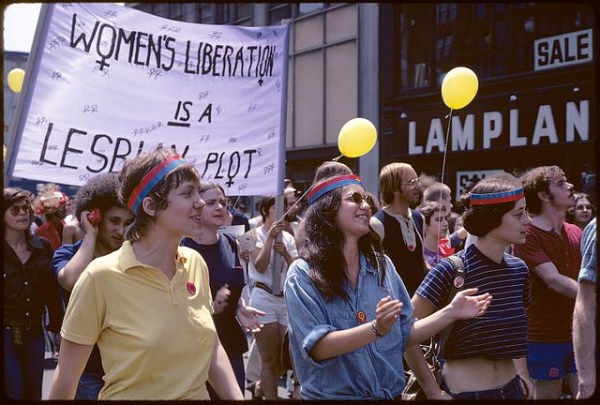
These are not new challenges. Feminism’s growing pains have been well-documented. Beginning in the 1970s and ’80s, heterosexual, middle-class, cis, white Western women feminists have been repeatedly called up on centering their own issues and forced to recognise that their needs just might not necessarily be the needs of say, a Black woman, a lesbian woman, a trans woman, a Muslim woman or a disabled woman.
In 1980, Adrienne Rich wrote the essay ‘Compulsory heterosexuality and lesbian existence’ as an answer to the rifts that were developing between women in the previous decade, as an attempt to reinforce the personal and political bonds between women. As this year is the 30th anniversary of this monumentally important, monumentally beautiful work, it seems fitting – even necessary – to return to Rich’s words to see what wisdom they may have for us today.
It was not Rich’s goal to encourage women to give up on men and sleep with women, nor is it mine. Her goal was to get women – both straight and lesbian – to reorient their lives around other women in ways that were available to some lesbian communities but not necessarily to other women.
“Feminism has not given most women a picture of a feminist society that could replace the one grounded in patriarchy and all of the myriad systems that combine to divide women from each other – from classism and racism, to ableism, nationalism, homophobia and transphobia.”
Lesbian feminism/political lesbianism has a fraught history and its relations with ‘mainstream’ and/or ‘hetero’ feminism have always been strained. In the 1970s, some revolutionary feminists, seeing the widespread violence and oppression that seemed, to some, inherent in heterosexuality, began calling on all women to be(come) lesbians.
A 2009 Guardian piece described the publication in 1981 of ‘Love Your Enemy: The Debate Between Heterosexual Feminism and Political Lesbianism’: “Love Your Enemy’ was authored by a group of Leeds feminists and said that “all feminists can and should be lesbians. Our definition of a political lesbian is a woman-identified woman who does not fuck men. It does not mean compulsory sexual activity with women.” It goes on to say: “We think serious feminists have no choice but to abandon heterosexuality.”
Political lesbianism came under fire, as to be expected, from feminists and non-feminists alike. Lesbian feminists experienced hostility from heterosexual feminists, who took offense at being placed on a “lower order” of feminism because of their sexuality, as well as from lesbians who feared hostility from heterosexual feminists and a subsequent rupturing of the feminist movement.
 Others thought that the classification of lesbianism as a political decision was cold-blooded and did not adequately describe the real emotions and relationships of and between women. Bea Campbell argued, according to The Guardian article, that political lesbianism was founded not on the love of women but on the fear and hatred of men. And Lynne Segal said that the media pounced on ‘Love Your Enemy’ and its authors, seeing an opportunity to identify it with feminism as a whole and thus derail the whole movement.
Others thought that the classification of lesbianism as a political decision was cold-blooded and did not adequately describe the real emotions and relationships of and between women. Bea Campbell argued, according to The Guardian article, that political lesbianism was founded not on the love of women but on the fear and hatred of men. And Lynne Segal said that the media pounced on ‘Love Your Enemy’ and its authors, seeing an opportunity to identify it with feminism as a whole and thus derail the whole movement.
Although there are still women who identify with political lesbianism and praise its philosophy, today most young women and feminists do not consider this kind of feminism a viable or helpful social or political tool.
Indeed, some young feminists take active steps to distance themselves from lesbian stereotypes.
I think, however, that if we strip lesbian feminism down to its core – to its advocacy of women-oriented female spaces, women-identified women, and an appreciation of the inequalities and violences that still permeate the heterosexual institution – we might find a lot of things worth keeping around. What Adrienne Rich’s work did was to strip away a lot of the misconceptions and pre-conceptions of what lesbianism was – that you had to hate men, that you had to have sex with women – and to expand the definition of lesbian to, simply, a woman who loved women. And what is a feminist if not a woman who loves women? If we want to save feminism, and I do think feminism needs saving, we’ve got to get back to that basic simple truth. Women have got to start loving women again.
Feminists have not been doing a great job of being “women-loving women”. Even the most cursory glance through current feminist discourse reveals deep ruptures in feminism. Earlier this year, Chloe Angyal wrote an article in The Guardian’s Comment is Free section entitled ‘You’re not a Feminist….but’, in which she describes, and criticises, the fear of the ‘F-word’ that has afflicted so many modern women. Women are busting balls and busting down doors, they believe in women’s rights and equal pay, they condemn violence against women – but they are unlikely to claim the identity “feminist”.
Why is this? “In the popular imagination,” Angyal says, “feminists are still the ugly, angry extremists who killed chivalry and who seek not gender equality, but world domination.”
Who would want others to think of them this way? Not I. Secondly, “Feminism demands a complete overhaul of how we think, how we behave, how we talk, where we work, what media we consume, how we vote and how we raise our families. For women and for men, feminism is a dramatic shift away from the way things have always been.”
In short, so many women aren’t “feminists” because they don’t identify with popular conceptions of what a “feminist” is and because identifying as a feminist means dismantling everything they know.
How women should organise their emotions?
Where – and to whom – do their loyalties lie? How should the family be organised?
I agree with Angyal. But I can’t really blame women who don’t identify as feminists. Women don’t turn away from feminism because they don’t identify with other “feminists” or because they’re afraid to make a splash; women turn away from feminism because the feminist movement, as yet, has not given most of them an alternative vision, a picture of a feminist society, a support network that could replace the one grounded in patriarchy and all of the myriad systems that combine to support patriarchy and divide women from each other – from classism and racism, to ableism, nationalism, homophobia and transphobia. Women do not have enough to identify with, or to turn towards, after they make, as Angyal says, the “dramatic shift away from the way things have always been”. They aren’t women-identified, they don’t have women-oriented spaces, and they still rely on heterosexual institutions to give them the love and fulfillment they need.
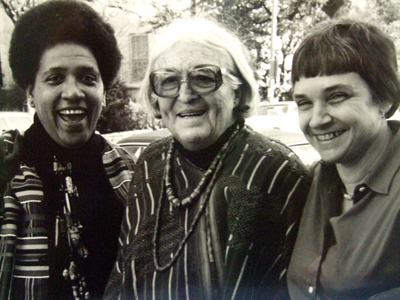 Wait, you might say: of course the feminist movement provides a woman-oriented support system. Well, read Renee Martin’s response to Angyal and you might change your mind. Martin explains that one of the reasons women eschew the term feminist is its history of white privilege. “I’m not a feminist”, she says, “because my life experiences led me to believe that feminism was not created for women like me.” That is, women of colour. Instead she chooses to identify with womanism, a term coined by Alice Walker as an alternative to feminism, on the basis feminism does not encompass black woman’s experiences (back in 1983, these are not new debates). Womanism values and recognises black woman’s experiences and relationships with one another, their relationships with black men, and, says Martin, comes from a place of self-love. According to Martin, when it comes to feminism, “sisterhood and camaraderie lasts only as long as you don’t insist on interrogating oppression from multiple sites” – in other words, as long as you don’t bring up issues such as race and class.
Wait, you might say: of course the feminist movement provides a woman-oriented support system. Well, read Renee Martin’s response to Angyal and you might change your mind. Martin explains that one of the reasons women eschew the term feminist is its history of white privilege. “I’m not a feminist”, she says, “because my life experiences led me to believe that feminism was not created for women like me.” That is, women of colour. Instead she chooses to identify with womanism, a term coined by Alice Walker as an alternative to feminism, on the basis feminism does not encompass black woman’s experiences (back in 1983, these are not new debates). Womanism values and recognises black woman’s experiences and relationships with one another, their relationships with black men, and, says Martin, comes from a place of self-love. According to Martin, when it comes to feminism, “sisterhood and camaraderie lasts only as long as you don’t insist on interrogating oppression from multiple sites” – in other words, as long as you don’t bring up issues such as race and class.
Okay, okay. But what, you might say, does any of this have to do with lesbianism? Well it does. Because what we’re really talking about – whether it’s how feminism should interact with race, with class, or with different sexual identities – is how feminism should be lived. And when you talk about how feminism should be lived, what you’re really talking about is how women should live with other women. What should the bonds between women look like? How women should organise their emotions? Where – and to whom – do their loyalties lie? How should the family be organised? What should they base their choices on? It’s not enough that we, as Angyal suggests, shift away from patriarchy – and other oppressions such as classism, and racism. We must shift towards something else entirely. It is in this respect that Adrienne Rich offers us a vision of feminist society in her concept of the “lesbian continuum”.
Heterosexual and bisexual readers, before you say: “Well I’m not a lesbian, this doesn’t apply to me”… read on.
Rich’s conceived of the “lesbian continuum” as a “political affiliation that can re-establish those lost same-sex loyalties by uniting women – heterosexual, bisexual and lesbian – in a mutual, woman-focused vision”. She wanted to do away with “male-identification” – or the casting of allegiances with men – and patriarchy – in such a way that men become the primary signifier of meaning, value and possibility culturally, socially, intellectually and politically. She quotes Kathleen Barry as describing male-identification as “the act whereby women place men above women, including themselves in credibility, status and importance in most situations, regardless of the comparative quality the women may bring to the situation…interaction with women is seen as a lesser form of relating on every level.”
Right off the top of my head I can think of dozens of examples of male-identification that many women – and I include myself – do every day. There’s the need to be beautiful, sexy or desirable to a man to feel beautiful, sexy or desirable at all. There’s the valuing of romantic relationships over female friendships. Or the notion that you should make decisions about where to live, what job to take, when or if to have kids and how to raise them based solely on your spouse, instead of on your mother, your sister, your best friend. Or the drive to enter the male-world instead of transforming it, to achieve male-defined success instead of changing the definition of what a successful life is – for example, by rising up the corporate ladder by working 80-hour weeks, instead of changing the nature of paid work itself to be more family-life-woman friendly.
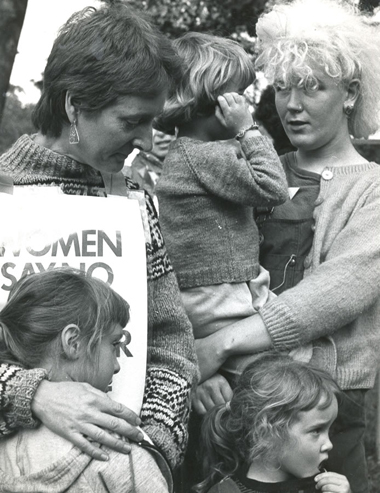 That being said, how can you expect straight women to act or to think any differently when so much of social, political and emotional life is organised around heterosexual institutions, including the nuclear family – to the detriment of other, enriching forms of social interaction.
That being said, how can you expect straight women to act or to think any differently when so much of social, political and emotional life is organised around heterosexual institutions, including the nuclear family – to the detriment of other, enriching forms of social interaction.
Consider this: between 1985 and 2004 US citizens reported a marked decline in the number of people with whom they discussed important, intimate matters and fewer close relationships with co-workers, extended family members, friends and neighbors. The only person with whom more people reported a tendency to discuss intimate matters was their spouse. Two-thirds of British married people would turn to a spouse first when they needed emotional help. Only 13% would turn to a relative or friend first. Stephanie Coontz reports that the number of people who depended totally on their spouse for conversations about intimate, important matters – i.e. who had no other close, regular emotional ties – doubled from 5% to 9.4%. The number of people who reported that they didn’t have anyone to talk to – even their spouse – tripled. The number of US people socialising outside of work has declined by 25% since 1965.
This is a relatively new phenomenon. According to Coontz, even up to the Victorian era “men wrote matter-of-factly about retiring to bed with a male roommate…and upright Victorian matrons thought nothing of kicking their husbands out of bed when a female friend came to visit. They spent the night kissing, hugging and pouring out their innermost thoughts.” It was the influence of Freudianism that caused society to begin to suspect, and discourage, powerful same-sex friendships. The cult of marriage that developed in the post-WWII era – the notion that all fulfillment, friendship and intimacy could come through the nuclear family – didn’t help matters much. Now Coontz says, as people “lose wider face-to-face ties that built social trust, they become more dependent on romantic relationships for intimacy and deep communication, and more vulnerable to isolation if a relationship breaks down”.
The result of this is a real lack of places from which women can mobilise, politically and personally, against patriarchy. Using the Greek definition of the erotic as the “personification of love”, Audre Lorde argues that the erotic connects all women as women. It is patriarchy and heteronormativity, racism and classism that cuts these ties. In 2007, I produced a paper that studied the correlation between feminist identifications and social capital. I found that there was a strong link between having a strong social network of women – mothers, sisters, cousins, neighbors, co-workers, friends – and identifying as a feminist. I was struck by how lonely the women who did not identify as a feminist were. They had far fewer regular contact with other women, who could act as role models or provide emotional support.
It seems necessary to me that we re-examine, as women, feminists or womanists, where our loyalties lie and how we organise our emotional life
Patriarchy has never operated alone. It has always used other oppressions such as racism and classism to subjugate women; one of the ways it has done so is to divide women from one another. Patriarchy throws divides up to distract women from its own operations and from the role it plays in creating those race/class divides. This is not to say that those divides aren’t real; rather, that they are constructed, that they have – in the most basic sense of the word – a his-story. We need to reorient our lives around women. As Rich says, woman identification is “a source of energy, a potential spring board of female power, curtailed and contained under the institution of heterosexuality – the denial of reality and visibility to women’s passion for women, women’s choice of women as allies, life companions, and community, the forcing of such relationships into dissimilation and their disintegration under intense pressure have meant an incalculable loss to the power of all women to change the social relations of the sexes, to liberate ourselves and each other.”
So where do we go from here? In sum, it seems necessary to me that we re-examine, as women, feminists or womanists, where our loyalties lie and how we organise our emotional life. We need to develop and maintain ties with other women. We need to develop our cognitive connections with other women, including women who do not share our beliefs or experiences, or who come from a different race, class, sexuality, nation, religion, or ethnicity.
If we sequester exclusively ourselves within our race, class, religion, sexual identity – or any of the other identities that keep women from one another – then we doom ourselves to continually re-enact the sad, violent histories that created these identities. Lorde says that “the considered phrase ‘it feels right to me’ acknowledges the strength of the erotic” for “the erotic is the nurturer or nursemaid of all our deepest knowledge.” In other words, self-love yields self-knowledge, and self-knowledge yields love for others. My self-knowledge, my self-love, and my love for other women, as women, tells me that there is more that unites us than divides us. It just feels right to me.
‘Rainbow flag’ photo from the No on 8 rally at Boston City Hall, November 15, 2008, taken by Flickr user qwrrty. Picture of Audre Lorde, Meridel Lesueur, Adrienne Rich (1980) taken by Flickr user K. Kendall. Picture from Greenham Common from Flickr user Your Greenham.
![]()
Compulsory Heterosexuality and Lesbian Existence, 30 Years Later is republished with permission from The F-Word, an online magazine dedicated to discussing ideas on contemporary UK feminism. From their mission statement:
“This webzine exists to help encourage a new sense of community among UK feminists, and to show the doubters that feminism still exists here, today, now – and is as relevant to the lives of the younger generation as it was to those in the 60s and 70s.”
A.J. Conroy is currently pursuing a Masters in Gender Studies at the School of Oriental and African Studies at the University of London.
Read a F*cking Book: Ten Lesbian & Bisexual Poets To Fall in Love With
Hi nerds! We were thinking today, about your needs, and we decided that some of you could probably use a little poetry in your lives. We’ve mashed our brains together and made a list (which could never ever be complete enough!) of ten amazing queer ladysexy poets that you should check out right now, if you haven’t already.
![]()
1. Adrienne Rich
(b. 1929)
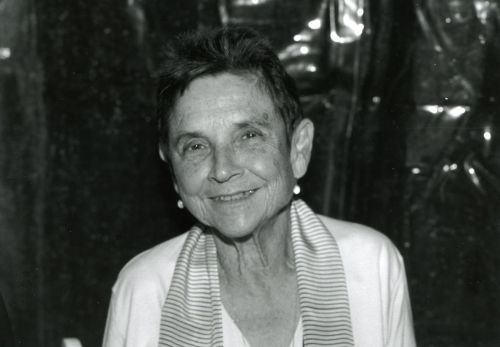
Adrienne Rich is more or less super- famous. She’s a major feminist and queer theorist (“Compulsory Heterosexuality” anyone?) who’s written heaps of non-fiction and poetry books. W.S Merwin said this about Adrienne Rich: “All her life she has been in love with the hope of telling utter truth, and her command of language from the first has been startlingly powerful.”
From “Transcendental Etude”:
There come times — perhaps this is one of them —
when we have to take ourselves more seriously or die
when we have to pull back from the incantations,
rhythms we’ve moved to thoughtlessly,
and disenthrall ourselves, bestow
ourselves to silence, or a severer listening, cleansed
of oratory, formulas, choruses, laments, static
crowding the wires.
Get Adrienne Rich’s books, like
The Dream of a Common Language: Poems 1974-1977
![]()
2. Eileen Myles
(b.1949)
I discovered Eileen Myles when she wrote an essay in The Believer about notebooks. I thought why did I not know about Eileen Myles before today. I asked my friend who knows everything about poetry and she didn’t understand why I didn’t know about Eileen Myles either. I don’t want this to happen to you.
Eileen Myles is “the rock star of modern poetry” (BUST Magazine) and “a cult figure to a generation of post-punk female writer-perfomers” (The New York Times) and we think that means that she’s super-honest and unafraid to get ugly or dirty or otherwise f*cked up. An East Village fixture with a working-class Boston background, she’s worked as Artistic Diretor of the St.Mark’s Poetry project, toured with Sister Spit and performed all around the world including at the Poetry Project, P.S. 122 and the WOW Café. Also she’s published like 15 books and has a “poet’s novel,” INFERNO, coming out this fall. Her memoir Chelsea Girls is one of Emily Gould’s favorites.
Some bits and pieces:
From “For Jordana”:
I think writing
is desire
not a form
of it
From “Dear Andrea”:
I love you too
don’t fuck up my hair
I can’t believe
you almost fisted me
today.
That was great.
From “Him and Others”:
Thoughts. Silly. I’d rather
sink my teeth in your neck,
seriously, knock you down
on the floor — all for love.
You’ll forget my lousy
poems but if I could just
mar you or something. Nothing
nice ever sticks but boy
a scar — If I could ever
really bruise you with
my feelings, them, so infinitely
forgettable & gone.
Get Eileen Myles: Sorry, Tree or Not Me (Native Agents).
Video Promo for INFERNO
+
![]()
3. Audre Lorde
(1934 – 1992)
In addition to being a poet, Audre Lorde is a mega-important feminist and activist who was at the forefront of a new group of politically active women of all colors challenging the white middle-class hegemony and subsequent ethnocentric goals of 1960s feminism. Lorde pioneered the concept that racism, sexism and homophobia were linked in that they stemmed from people’s inability to recognize or tolerate difference.
“I am a black feminist lesbian poet,” Lorde said of her work, “and I identify myself as such because if there is one other black feminist lesbian poet in isolation somewhere within the reach of my voice, I want her to know she is not alone.”
On the topic of art as protest:
“… the question of social protest and art is inseparable for me. I can’t say it is an either-or proposition. Art for art’s sake doesn’t really exist for me. What I saw was wrong, and I had to speak up. I loved poetry, and I loved words. But what was beautiful had to serve the purpose of changing my life, or I would have died. If I cannot air this pain and alter it, I will surely die of it. That’s the beginning of social protest.”
From “Who Said It Was Simple”:
But I who am bound by my mirror
as well as my bed
see causes in color
as well as sex
and sit here wondering
which me will survive
all these liberations.
Get yourself some Audre Lorde books now.
![]()
4. Kirya Traber

I met Kirya Traber when she toured with Sister Spit in 2009. Aside from being a killer slam poet with years of festivals under her belt, she’s also working as the Residency Program Manager for YouthSpeaks. Her poems deal with feminism, hair, race and Nina Simone, among other things.
From “Roll Call”:
thick and road worn,
dirt stained, jacked up 4 wheeler
truck behind us
one hand
on my mother’s shoulder
“You better watch your little black bitch”
I could smell his breath
tobacco plaque tangy
from across the front seat
and even then, I didn’t know
he was talking about me
Follow Kirya Traber on twitter
![]()
5. Alix Olson
(b. 1975)
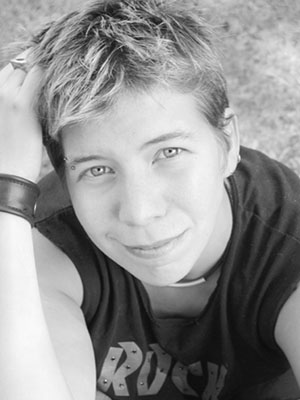
Alix Olson is a spoken word poet / “red-hot, fire-bellied, feminismo-spewin’ volcano.” She tours the world, has been featured in practically every relevant magazine or newspaper and has put out a couple of albums – Built Like That and Independence Meal – that you should buy and eat with your ears. She interviewed Rachel Maddow for Velvet Park magazine, which is really neither here nor there, but I thought you might like to read it.
Random Book edited by Alix Olson: Word Warriors: 35 Women Leaders in the Spoken Word Revolution
![]()
6. June Jordan
(1936- 2002)

Harlem born bisexual June Jordan was a Carribbean-American poet, novelist, journalist, biographer, dramatist, teacher and activist with lots of important super-passionate felings about the construction of race, gender, sexuality, politics, war, violence and human rights. She’s one of the most prolific African-American writers of all time with 28 books of varying genres like essays, memoirs, novels, poetry and children’s books. You know how Barack Obama was always saying “we are the ones we’ve been waiting for”? He got it from June Jordan. Or from Alice Walker who got it from June Jordan. You know.
HAY HOLLER BISXEXUALS, she’s got some words about y’all: “If you are free, you are not predictable and you are not controllable. To my mind, that is the keenly positive, politicizing significance of bisexual affirmation… to insist upon the equal validity of all the components of social/sexual complexity.”
Read this interview with June Jordan at BOMB Magazine about “I Was Looking at the Ceiling and Then I Saw the Sky,” an experimental contemporary opera made in collaboration with composer John Adams and director Peter Sellars, that tells the stories of “men and women in Los Angeles struggling to find and articulate love in the midst of moral and physical devastation, tragedy, and upheaval . . . Like all of her work, the opera strives to bear witness to the human ability to survive nightmares of injustice and embrace visions of a more hopeful future.”
“One Minus One Minus One”
This is a first map of territory
I will have to explore as poems,
again and again
My mother murdering me
to have a life of her own
What would I say
(if I could speak about it?)
My father raising me
to be a life that he
owns
What can I say
(in this loneliness)
![]()
7. Staceyann Chin
(b.1971)
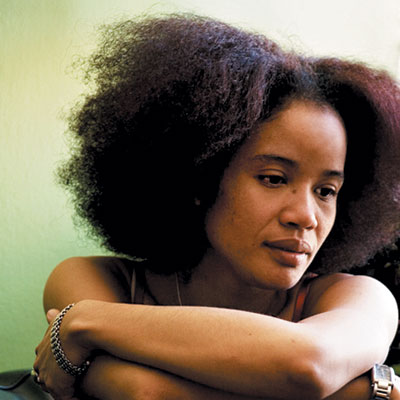
Staceyann Chin grew up in the part of Jamaica where buses full of white tourists don’t go. Her memoir, The Other Side of Paradise, deals with her mother’s rejection of Chin and her brother, and her subsequent struggle to grow up in the face of poverty and a splintered family.
From Publisher’s Weekly:
“[Chin’s mother] quickly foisted them onto other relatives for good, leaving Chin, at age nine, to fend for herself in the shack of her harsh great-aunt whose boys routinely attempted to rape her.”
Chin moved to New York several years ago and is an out lesbian political activist poet womanchild. She writes things like this, which I think you will like:
Faggot Haiku
Faggots reach into
their own asses we are not
afraid of our shit
![]()
8. Andrea Gibson
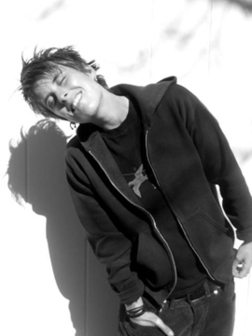
Andrea Gibson is another spoken word American poet and activist. Her latest album, Yellowbird, features a version of one of her most ridiculously moving pieces, “Ashes,” with music from Chris Pureka. Here just watch this:
Buy Pole Dancing To Gospel Hymns
![]()
9. Marilyn Hacker
(b. 1942)

Jan Heller Levi, who sounds pretty important, said this about Marilyn Hacker which is better than what I might say: “I think of her magnificent virtuosity in the face of all the strictures to be silent, to name her fears and her desires, and in the process, to name ours. Let’s face it, no one writes about lust and lunch like Marilyn Hacker. No one can jump around in two, sometimes even three, languages and come up with poems that speak for those of us who sometimes barely think we can even communicate in one.”
“Untitled”:
You did say, need me less and I’ll want you more.
I’m still shellshocked at needing anyone,
used to being used to it on my own.
It won’t be me out on the tiles till four-
thirty, while you’re in bed, willing the door
open with your need. You wanted her then,
more. Because you need to, I woke alone
in what’s not yet our room, strewn, though, with your
guitar, shoes, notebook, socks, trousers enjambed
with mine. Half the world was sleeping it off
in every other bed under my roof.
I wish I had a roof over my bed
to pull down on my head when I feel damned
by wanting you so much it looks like need.
![]()
10. Mary Oliver
(b. 1935)
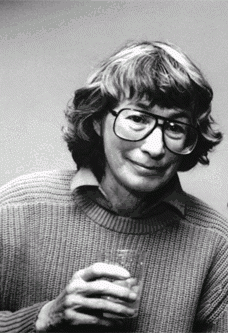
Mary Oliver spent a few of her teenage years living in Edna St. Vincent Millay’s old house, helping Millay’s family sort through her old papers, so you know she’s gangsta. Since the early 1960s, Oliver has published heaps of poetry and prose, including American Primitive, which won the Pulitzer prize for poetry in 1984. Her work is heavily informed by her reflections on her natural surroundings, conjuring up images of her native Ohio and New England; the Harvard Review described her work as an “excellent antidote for the excesses of civilization.”
From “Wild Geese”:
You do not have to be good.
You do not have to walk on your knees
for a hundred miles through the desert, repenting.
You only have to let the soft animal of your body
love what it loves.
Tell me about despair, yours, and I will tell you mine.
Meanwhile the world goes on.
